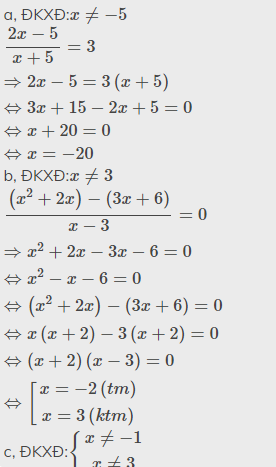
Hãy nhập câu hỏi của bạn vào đây, nếu là tài khoản VIP, bạn sẽ được ưu tiên trả lời.


a: =>-x+2x=3-7
=>x=-4
b: =>6x+2+2x-5=0
=>8x-3=0
hay x=3/8
c: =>5x+2x-2-4x-7=0
=>3x-9=0
hay x=3
d: =>10x2-10x2-15x=15
=>-15x=15
hay x=-1

a, ĐKXĐ:\(x\ne-5\)
\(\dfrac{2x-5}{x+5}=3\\ \Rightarrow2x-5=3\left(x+5\right)\\ \Leftrightarrow3x+15-2x+5=0\\ \Leftrightarrow x+20=0\\ \Leftrightarrow x=-20\)
b, ĐKXĐ:\(x\ne3\)
\(\dfrac{\left(x^2+2x\right)-\left(3x+6\right)}{x-3}=0\\ \Rightarrow x^2+2x-3x-6=0\\ \Leftrightarrow x^2-x-6=0\\ \Leftrightarrow\left(x^2+2x\right)-\left(3x+6\right)=0\\ \Leftrightarrow x\left(x+2\right)-3\left(x+2\right)=0\\ \Leftrightarrow\left(x+2\right)\left(x-3\right)=0\\ \Leftrightarrow\left[{}\begin{matrix}x=-2\left(tm\right)\\x=3\left(ktm\right)\end{matrix}\right.\)
c, ĐKXĐ:\(\left\{{}\begin{matrix}x\ne-1\\x\ne3\end{matrix}\right.\)
\(\dfrac{x}{2\left(x-3\right)}+\dfrac{x}{2x+2}=\dfrac{2x}{\left(x+1\right)\left(x-3\right)}\\ \Leftrightarrow x\left(\dfrac{1}{2\left(x-3\right)}+\dfrac{1}{2\left(x+1\right)}-\dfrac{2}{\left(x+1\right)\left(x-3\right)}\right)=0\\ \Leftrightarrow x\left(\dfrac{x+1}{2\left(x-3\right)\left(x+1\right)}+\dfrac{x-3}{2\left(x+1\right)\left(x-3\right)}-\dfrac{4}{2\left(x+1\right)\left(x-3\right)}\right)=0\\ \Leftrightarrow x.\dfrac{x+1+x-3-4}{2\left(x-3\right)\left(x+1\right)}=0\\ \Leftrightarrow\dfrac{x\left(2x-6\right)}{2\left(x-3\right)\left(x+1\right)}=0\\ \Leftrightarrow\dfrac{2x\left(x-3\right)}{2\left(x-3\right)\left(x+1\right)}=0\\ \Leftrightarrow\dfrac{x}{x+1}=0\\ \Rightarrow x=0\left(tm\right)\)

ta có : x^5+2x^4+3x^3+3x^2+2x+1=0
\(\Leftrightarrow\)x^5+x^4+x^4+x^3+2x^3+2x^2+x^2+x+x+1=0
\(\Leftrightarrow\)(x^5+x^4)+(x^4+x^3)+(2x^3+2x^2)+(x^2+x)+(x+1)=0
\(\Leftrightarrow\)x^4(x+1)+x^3(x+1)+2x^2(x+1)+x(x+1)+(x+1)=0
\(\Leftrightarrow\)(x+1)(x^4+x^3+2x^2+x+1)=0
\(\Leftrightarrow\)(x+1)(x^4+x^3+x^2+x^2+x+1)=0
\(\Leftrightarrow\)(x+1)[x^2(x^2+x+1)+(x^2+x+1)]=0
\(\Leftrightarrow\)(x+1)(x^2+x+1)(x^2+1)=0
VÌ x^2+x+1=(x+\(\dfrac{1}{2}\))^2+\(\dfrac{3}{4}\)\(\ne0\) và x^2+1\(\ne0\)
\(\Rightarrow\)x+1=0
\(\Rightarrow\)x=-1
CÒN CÂU B TỰ LÀM (02042006)
b: x^4+3x^3-2x^2+x-3=0
=>x^4-x^3+4x^3-4x^2+2x^2-2x+3x-3=0
=>(x-1)(x^3+4x^2+2x+3)=0
=>x-1=0
=>x=1

1
\(\left|5x+8\right|=0\\ 5x+8=0\\ 5x=8\\ x=\dfrac{8}{5}\\ x=1.6\)
2
\(\left|1-3x\right|=1\\ 1-3x=1\\ \Rightarrow\left\{{}\begin{matrix}1-3x=1\Leftrightarrow3x=0\Leftrightarrow x=0\\1-3x=\left(-1\right)\Leftrightarrow3x=-2\Leftrightarrow x=\dfrac{-2}{3}\end{matrix}\right.\)
3
\(\left|3x+2\right|=-3\Rightarrow\varnothing\)
phương trình vô nghiệm vì giá trị tuyệt đối của mọi số điều không âm
4
\(|x-1|=3x+5\) (1)
Ta có \(|x-1|= x-1 \) khi \(x-1\ge0\Rightarrow x\ge1\)
\(\left|x-1\right|=-\left(x-1\right)=1-x\) khi \(x-1< 0\Rightarrow x< 1\)
Với \(x\ge1\) phương trình (1)
\(x-1=3x+5\\ \Leftrightarrow x-3x=5+1\\ \Leftrightarrow-2x=6\\ \Leftrightarrow x=\dfrac{-6}{2}=-3\)
x= -3 không thỏa mãn điều kiện
Với \(x< 1\) phương trình (1)
\(1-x=3x+5\\ \Leftrightarrow-x-3x=5-1\\ \Leftrightarrow-4x=4\\ \Leftrightarrow-4x\cdot\dfrac{-1}{4}=4\cdot\dfrac{-1}{4}\\ \Leftrightarrow x=-1\)
x=-1 thỏa mãn điều kiện
:v cậu đăng ít thôi nhé pai pai
này mình chưa học đâu cớ tuần sau mới học ấy nhưng mà mình coi dạng rồi làm cho cậu nè ;-;

a, đk : x >= 1
\(\left[{}\begin{matrix}3x+5=2x-2\\3x+5=2-2x\end{matrix}\right.\Leftrightarrow\left[{}\begin{matrix}x=-7\\x=-\dfrac{3}{5}\end{matrix}\right.\left(ktm\right)\)
vậy pt vô nghiệm
b, đk >= 0
\(\left[{}\begin{matrix}x^2+1=2x\\x^2+1=-2x\end{matrix}\right.\Leftrightarrow\left[{}\begin{matrix}\left(x-1\right)^2=0\\\left(x+1\right)^2=0\end{matrix}\right.\Leftrightarrow\left[{}\begin{matrix}x=1\left(tm\right)\\x=-1\left(ktm\right)\end{matrix}\right.\)
c, \(\left[{}\begin{matrix}2x^2+2x=0\\2x^2+4x+2=0\end{matrix}\right.\Leftrightarrow\left[{}\begin{matrix}2x\left(x+1\right)=0\\x^2+2x+1=0\end{matrix}\right.\Leftrightarrow\left[{}\begin{matrix}x=0;x=-1\\x=-1\end{matrix}\right.\)

a, \(5\left|2x-1\right|-3=7\Leftrightarrow5\left|2x-1\right|=10\Leftrightarrow\left|2x-1\right|=2\)
TH1 : \(2x-1=2\Leftrightarrow x=\frac{3}{2}\)
TH2 : \(2x-1=-2\Leftrightarrow x=-\frac{1}{2}\)
b, \(\left(2x+3\right)\left(x-2\right)-x^2+4=0\Leftrightarrow\left(2x+3\right)\left(x-2\right)-\left(x-2\right)\left(x+2\right)=0\)
\(\Leftrightarrow\left(x-2\right)\left(2x+3-x-2\right)=0\Leftrightarrow\left(x-2\right)\left(x+1\right)=0\Leftrightarrow x=-1;x=2\)
c, \(\frac{2x-3}{2}< \frac{1-3x}{-5}\Leftrightarrow\frac{2x-3}{2}+\frac{1-3x}{5}< 0\)
\(\Leftrightarrow\frac{10x-15+2-6x}{10}< 0\Rightarrow4x-13< 0\Leftrightarrow x< \frac{13}{4}\)

a) \(x^5+2x^4+3x^3+3x^2+2x+1=0\)
\(\Leftrightarrow x^5+x^4+x^4+x^3+2x^3+2x^2+x^2+x+x+1=0\)
\(\Leftrightarrow x^4\left(x+1\right)+x^3\left(x+1\right)+2x^2\left(x+1\right)+x\left(x+1\right)+\left(x+1\right)=0\)
\(\Leftrightarrow\left(x+1\right)\left(x^4+x^3+2x^2+x+1\right)=0\)
\(\Leftrightarrow\left(x+1\right)\left(x^4+x^3+x^2+x^2+x+1\right)=0\)
\(\Leftrightarrow\left(x+1\right)\left[x^2\left(x^2+x+1\right)+\left(x^2+x+1\right)\right]=0\)
\(\Leftrightarrow\left(x+1\right)\left(x^2+x+1\right)\left(x^2+1\right)=0\)
Dễ thấy \(x^2+x+1>0\forall x;x^2+1>0\forall x\)
\(\Rightarrow x+1=0\)
\(\Leftrightarrow x=-1\)
Vậy....
b) \(x^4+3x^3-2x^2+x-3=0\)
\(\Leftrightarrow x^4-x^3+4x^3-4x^2+2x^2-2x+3x-3=0\)
\(\Leftrightarrow x^3\left(x-1\right)+4x^2\left(x-1\right)+2x\left(x-1\right)+3\left(x-1\right)=0\)
\(\Leftrightarrow\left(x-1\right)\left(x^3+4x^2+2x+3\right)=0\)
...
\(\Leftrightarrow x=1\)
p/s: có bác nào giải đc pt \(x^3+4x^2+2x+3=0\)thì giúp nhé :))

a) \(PT\Leftrightarrow3x-2x=2-3\Leftrightarrow x=-1\)
Vậy: \(S=\left\{-1\right\}\)
b) \(PT\Leftrightarrow-2x+3x=-7+22\Leftrightarrow x=15\)
Vậy: \(S=\left\{15\right\}\)
c) \(PT\Leftrightarrow8x-5x=3+12\Leftrightarrow3x=15\Leftrightarrow x=5\)
Vậy: \(S=\left\{5\right\}\)
d) \(PT\Leftrightarrow x+4x-2x=12+25-1\Leftrightarrow3x=36\Leftrightarrow x=12\)
Vậy: \(S=\left\{12\right\}\)
e) \(PT\Leftrightarrow x+2x+3x-3x=19+5\Leftrightarrow3x=24\Leftrightarrow x=8\)
Vậy: \(S=\left\{8\right\}\)
a)3x-2=2x-3
=>x=-1
b)7-2x=22-3x
=>x=15
c)8x-3=5x+12
=>3x=15
=>x=5
d)x-12+4x=25+2x-1
=>3x=12
=>x=4
e)x+2x+3x-19=3x+5
=>3x=24
=>x=8

a: =>17x-5x-15-2x-5=0
=>10x-20=0
=>x=2
b: =>\(\dfrac{3x-6-5x-10}{\left(x+2\right)\left(x-2\right)}=\dfrac{11x+23}{\left(x+2\right)\left(x-2\right)}\)
=>11x+23=-2x-16
=>13x=-39
=>x=-3(nhận)
c: =>5x+7>=3x-3
=>2x>=-10
=>x>=-5
d: =>5(3x-1)=-2(x+1)
=>15x-5=-2x-2
=>17x=3
=>x=3/17
e: =>4x^2-1-4x^2-3x-2=0
=>-3x-3=0
=>x=-1
g: =>7x-5-8x+2-7<0
=>-x-10<0
=>x+10>0
=>x>-10

a) Ta có :
\(\frac{2x-5}{x+5}=3\)
\(\Leftrightarrow\)\(2x-5=3\left(x+5\right)\)
\(\Leftrightarrow\)\(2x-5=3x+15\)
\(\Leftrightarrow\)\(3x-2x=-5-15\)
\(\Leftrightarrow\)\(x=-20\)
Vậy \(x=-20\)
b) Ta có :
\(\frac{5}{3x+2}=2x-1\)
\(\Leftrightarrow\)\(5=\left(2x-1\right)\left(3x+2\right)\)
\(\Leftrightarrow\)\(5=3x\left(2x-1\right)+2\left(2x-1\right)\)
\(\Leftrightarrow\)\(5=6x^2-3x+4x-2\)
\(\Leftrightarrow\)\(6x^2+x=7\)
\(\Leftrightarrow\)\(x\left(6x+1\right)=7\)
TRƯỜNG HỢP 1 :
\(\hept{\begin{cases}x=1\\6x+1=7\end{cases}\Leftrightarrow\hept{\begin{cases}x=1\\6x=6\end{cases}\Leftrightarrow}\hept{\begin{cases}x=1\\x=1\end{cases}}}\)
TRƯỜNG HỢP 2 :
\(\hept{\begin{cases}x=-1\\6x+1=-7\end{cases}\Leftrightarrow\hept{\begin{cases}x=-1\\6x=-8\end{cases}\Leftrightarrow}\hept{\begin{cases}x=-1\\x=-\frac{4}{3}\end{cases}}}\)( LOẠI )
Vậy \(x=1\)